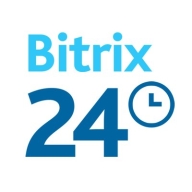

Salesforce Sales Cloud and Bitrix24 compete in the CRM and business management software category. While Salesforce Sales Cloud offers more comprehensive features, Bitrix24 appeals to businesses looking for straightforward and cost-effective solutions.
Features: Salesforce Sales Cloud provides extensive customization, robust CRM tracking, and seamless integration with various applications. Users highlight its flexible reporting features and high configurability. Bitrix24 offers a straightforward CRM interface, third-party integrations, and task-based project management functionality, praised for its cost-effectiveness and customizable workflows.
Room for Improvement: Users find Salesforce intricate with a steep learning curve, often requiring significant customization, and limited integration without extra costs. Bitrix24 is noted for a less intuitive interface, occasional bugs, and lacking cohesion in project management. Salesforce's price and complexity can be challenging, whereas Bitrix24's limitations may hinder scalability.
Ease of Deployment and Customer Service: Salesforce offers versatile deployment options, including public and hybrid cloud solutions, with mixed reviews on customer service. Bitrix24 primarily uses public cloud and on-premise methods, noted for reliable customer service. Salesforce offers a broad service range, while Bitrix24 provides consistent support irrespective of service level.
Pricing and ROI: Salesforce is a premium option with higher licensing costs, complex pricing structures, and additional fees, but users report significant ROI through enhanced productivity. Bitrix24 is considered a cost-effective alternative with affordable licensing, appealing to smaller businesses or those with limited budgets.
Salesforce Sales Cloud is a fantastic tool but requires disciplined data entry by sales personnel and operations teams to maintain data quality.
We are not just implementing Salesforce Sales Cloud; we need to understand what the customer wants to achieve in 5 to 10 years.
Support requires a subscription and when taken, the service is pretty nice.
It scales effortlessly with user growth.
Salesforce is highly scalable and operates efficiently.
Salesforce Sales Cloud is very stable.
I have not experienced any degradation in Salesforce's performance.
Compared to AWS, it is slower, which could be a hindrance.
With today's generative AI capabilities like ChatGPT, it should be possible to directly communicate with the software rather than navigating through the entire system manually.
Without negotiation, costs can become expensive.
This happened for the first time because of the new CEO, Arundhati, who revolutionized pricing strategies, allowing discounts of 60-70% for Salesforce Sales Cloud in India.
I would rate the price for Salesforce Sales Cloud as a three, where one is a high price.
Its easy-to-navigate interface aids in delivering clear vision and organization, especially for sales and business management.
The biggest benefit of the Salesforce Sales Cloud is a centralized point, a centralized source of truth for customer-related information; you centralize all the information in a single database, and that's the biggest benefit.
The Einstein Analytics and the inbuilt reporting are very useful for keeping track of pipeline movement.


Communication and collaboration tools
Ready for unified collaboration? Intranet, chat, videoconferencing, calendars, workspaces, documents, tasks and internal communication tools in one place!
Group task management
Collaborative task management for teams large and small. Time tracking, reminders, reporting, templates, task dependencies and more.
Salesforce Sales Cloud is a comprehensive CRM platform designed for efficient lead management, sales forecasting, and customer engagement, offering extensive customization and cloud-based accessibility.
Aimed at enhancing business efficiency, Salesforce Sales Cloud supports core business processes like CRM, lead and opportunity management, sales forecasting, and customer engagement. Its robust integration capabilities allow seamless connectivity with ERP systems and various applications. The platform offers pipeline tracking, process automation, and advanced sales cycle management. Users appreciate its cloud-based accessibility, allowing teams to operate remotely and manage sales operations effectively. However, users highlight concerns about its complexity, cost, and the need for a more intuitive interface.
What features does Salesforce Sales Cloud offer?Salesforce Sales Cloud is widely implemented across industries such as finance, healthcare, and retail, supporting sales teams in tracking and managing sales operations. Its use extends to reporting, collaboration, and enhancing client interactions, allowing companies to tailor Salesforce to meet industry-specific requirements efficiently.
We monitor all CRM reviews to prevent fraudulent reviews and keep review quality high. We do not post reviews by company employees or direct competitors. We validate each review for authenticity via cross-reference with LinkedIn, and personal follow-up with the reviewer when necessary.